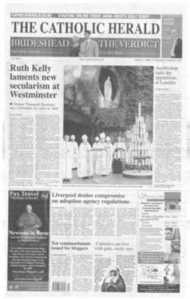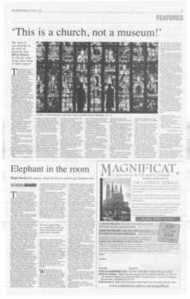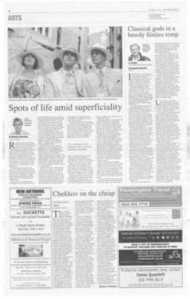Page 16, 3rd October 2008
Page 16

Report an error
Noticed an error on this page?If you've noticed an error in this article please click here to report it.
Tags
Share
Related articles
Let's Be Snobs But Not The Inferior Kind
Brideshead Gets Its
Brideshead Reviewed — The Grace Behind The Glamour
Spots Of Life Amid Superficiality
Bless The Brideshead With A Happy Ending
Stuart Reid Charterhouse
Iknow an attention-seeking snob who likes to say that the best thing about Brideshead Revisited is the first sentence of the preface to the revised edition of 1960.
The sentence reads: "This novel, which is here reissued with many small additions and some substantial cuts, lost me such esteem as I once enjoyed among my contemporaries and led me into an unfamiliar world of fan mail and press photographers."
The snob is wrong, but the lofty self-deprecation of that sentence is irresistible, not least because it is almost entirely bogus, or at any rate disingenuous. The truth is that the novel was well received by Waugh's contemporaries.
"The reception of the book on the issue of the first edition [1945] was so enthusiastic," wrote Christopher Sykes, "that one can almost use the word ecstatic with precision." Among those who heaped praise on Brideshead Revisited — now a major motion picture were Henry Yorke, Graham Greene, Desmond MacCarthy, Osbert Sitwell, John Betjeman and — 000ps — Cecil Beaton.
Once the stardust had settled, however, there was indeed some carping and sniggering, and it has lasted to this day. Brideshead is both the most loved and least liked of Waugh's novels.
The American literary critic Edmund Wilson predicted that it would be a huge success, not because of its merits — which he nonetheless acknowledged but because it had all the ingredients of best-selling trash. Wilson was right — at least about the book's success. Brideshead was a hit. and nowhere more so than in the United States.
What a cross this was for Waugh? He loved the American lolly, but felt it demeaning that Americans should enjoy his work.
At a dinner party given by Mary Lygon, daughter of Lord Beauchamp (model for Lord Marchmain), a "very nice American lady" said to Waugh: "Oh. Mr Waugh, I have just been reading your new book Brideshead Revisited, and I think it is one of the best books I have ever read.
"I thought it was good myself," said Waugh, "But now that I know that a vulgar, boring American woman like yourself admires it, I am not so sure."
I'm on the side of the nice American lady. No matter what the more fastidious critics say, and in spite of Waugh's own misgivings, I like Brideshead, even if it is in places overwrought and overwritten. The opening of the first chapter always leaves me sighing and pressing 'the back of my hand to my forehead:
" 'I have been here before,' I said; I had been there before; first with Sebastian more than 20 years ago on a cloudless day in June, when the ditches were creamy with meadowsweet and the air heavy with all the scents of summer; it was a day of peculiar splendour, and though I had been there so often, in so many moods, it was to that first visit that my heart returned on this, my latest." That's more or less perfect, though my good friend Michael McMahon, writer, prison chaplain and former chairman of the Latin Mass Society, says that if he'd been editing the book he would have contrived to add the word"plashy" to that paragraph.
All the same, I do have difficulties with Brideshead, as who does not? Evelyn Waugh was only human, all signs to the contrary notwithstanding, and he could err. In my view there are two lapses of taste and judgment in Brideshead: Lord Marchmain and Hooper.
The theme of the novel, as Waugh tells us, is "the operation of divine grace on a group of diverse but closely related characters"; and the heart of the matter is the deathbed repentance of Marchmain. But I am not persuaded by the scene. To be sure, it makes you blob. but is it not a bit Mills and Boon? At any rate it has always seemed entirely appropriate that in the brilliant TV adaptation of 1981 — itself a work of art — Marchmain was played by that great ham Laurence Olivier.
Then there is Hooper. Lord Marchmain goes to purgatory, maybe even straight to heaven (and why not?). But what becomes of Hooper? I do not think we are supposed to care. Hooper says "rightyoh" and "okeydoke" and has the wrong kind of hair. He is therefore beyond the pale.
It may be priggish to object to what has been called Waugh's "snobbery with violence", but sometimes you've just got to be a prig. and perhaps remind yourself that Waugh was a child of Golders Green and a product of Lancing.
Thank God, though, for Lady Marchmain and the "wooden" Julia. Lady Marchmain is the hero of Brideshead, the character through whom divine grace operates. Those of us who are, or have been, controlfreak Catholic parents will identify with her. She twitches everybody's thread, she yanks everybody's chain ... and dies convinced that she has failed her children, even her estranged husband. But she has not. In the end it is through her brittle sanctity and prayers, perhaps through her "delicate irony", that the wayward, wilful members of her family are reconciled to the Church, and Charles Ryder converts, Julia's tearful monologue on living in sin is mocked in some quarters, but it is powerful, moving and true, and makes us uncomfortable. Her final rejection of Charles is equally powerful. What is not so hot — and here the carpers are right — is Julia's first sexual encounter with Charles. Waugh should have left that sort of thing to Henry Miller,
Still. as Joe E Brown said, nobody's perfect, and Waugh was after all the forest English prose writer of
the last century, and enormously, outrageously funny.B reak out the champagne and the fiddleback
chasubles, fill up your SUVs, saddle the .
horses, prime the flintlocks ... and prepare to head north. On October 11. at 5pm, there is to be a Latin Mass in the traditional form at Ampleforth, during the Old Amplefordian weekend.
I gather it will be the first traditional Latin Mass said publicly at the abbey for more than 40 years. There will be a dinner afterwards for old boys ... 000ps, and old girls. Evelyn Waugh is welcome. So. too. by the way is Christopher Hitchens • who wrote an excellent defence of Waugh, Brideshead and Tradition in the Guardian at the weekend.
blog comments powered by Disqus

















